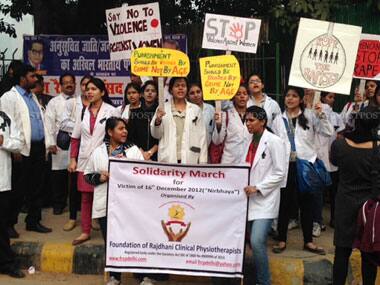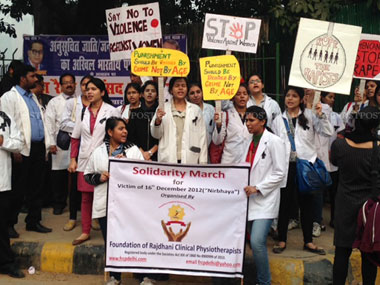New Delhi: Today, 16 December 2013, marks one year since the horrific Delhi gangrape which caused massive nationwide protests across India. From students groups to ordinary citizens, the streets of Delhi last year were filled with those demanding justice for the victim and a change in the country’s rape laws. One year on, the violence against women continues and so do the protests, except that the crowds have waned. Jantar Mantar in Delhi today was the site of a spattering of protests from various groups and organisations, each with their own set of demands. The most prominent of such groups is the 16 December Kranti group. They have been on a year long protest demanding change in the laws and death penalty for the all accused, including the juvenile, in the Delhi gangrape case. They were found chanting, “phansi do, phansi do ( Hang them, Hang them)”, at the protest site. And while the place is buzzing with television cameras and reporters, it isn’t a very large gathering for their group. Still that hasn’t deterred them from giving speeches and talking about how the government has done nothing to help the rape victims. [caption id=“attachment_1289845” align=“alignleft” width=“380”]  Protests in Delhi. Firstpost.[/caption] A lady speaker is soon handed the mike and she talks at length about the way girls are made to suffer in India from when the crime takes place to when they give testimony in court. “Hamari beteion ko itne gande, gande sawal puchte hain, woh kuch nahi bol bati,” she screams into the mike. (Our daughters are asked such filthy, filthy questions that they feel ashamed to give testimony in court.) Pallavi Sreshtha, who has been involved with the group for one year, is a 21-year old college student. When asked as to what she hopes for, she points to what the crowd is chanting. “Phansi hi honi chahiye (They should be hanged)." “Even the juvenile should be hanged. If he can rape, then why should he not face the punishment,” she asks. In Pallavi’s view not much has changed since the Delhi gangrape case. “I don’t think there has been any change since the 16 December rape case. I think the rape cases have increased since the Damini rape case.” she says. She adds hesitantly, “Maybe if these people are hanged, the number of rapes will fall.” Despite the Metro services, travelling late at night is still a big no, no for Pallavi. “I don’t’ think it’s safe to travel in Delhi even now at night. Metro is safe, you can travel in that even late at night. But once, I come out of the metro, the biggest fear is how to get home, especially if you are late. Each girl has this fear inside her that Delhi is not safe at night,” she says. Supriya Singh, who is with Srijan Artist Group is a little unsure of what they hope to achieve by the protest. The group is painting at the protest site and painted a large banner to remember the Delhi gangrape victim. “I feel the government did not do enough. The case went on for so long, despite the protests. Even now the juvenile does not face death sentence, ” she points out. When it asked about the death penalty and whether it will stop crimes like rape, she’s a little hesitant. She says, “It won’t stop rapes for sure. But hopefully, there will be fear in the minds of culprits.” Madhumita Pandey, who finished her Masters in the UK, is also protesting with two other friends. The trio stands out because unlike the others they have no placards, no angry slogans. Madhumita admits that she is confused about why she is here. “I do wonder why everyone is out here protesting given that one man (Ram Singh) was the kingpin and he is dead and the others have been convicted. What happened last year bought a lot of people together and there was a strong movement. I’m hoping to come next year and perhaps see more people,” she says. When asked whether she thinks death penalty will help, she disagrees. “I’m against capital punishment and I don’t think hanging the convicts will help. Once you bring in death sentence, you’ll see rapes and murders happening because the perpetrators of the crime will want to make sure that the victim can’t name them,” she says. Perhaps one of the youngest protestors at Jantar Mantar is 12-year-old Preeti who has come with the NGO Sampurna foundation. She says it is the ‘mam’ at the foundation who has bought them to the protest. When asked if she knows why the protest is happening she says with, “Because of all these rapes.” In her understanding rape is committed by men and “in ladkon ko jo rape karte hai, saza deni chayie (the boys who commit rape should be punished)”.
Today, 16 December 2013, marks one year since the horrific Delhi gangrape which caused massive nationwide protests across India. From students groups to ordinary citizens, the streets of Delhi last year were filled with those demanding justice for the victim and a change in the country’s rape laws.
Advertisement
End of Article


)

)
)
)
)
)
)
)
)



